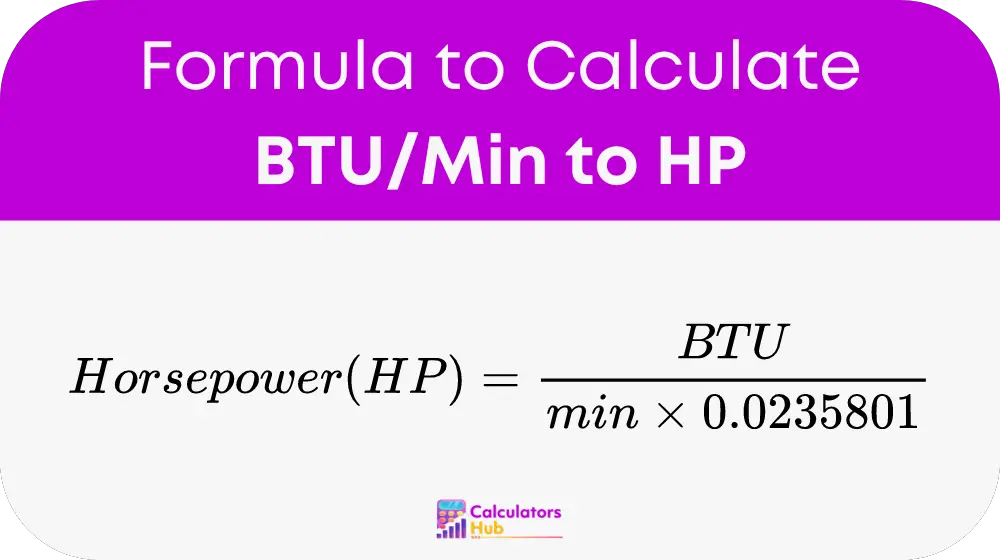The BTU/Min to HP (Horsepower) Calculator is a tool designed to convert energy measured in British Thermal Units per minute (BTU/min) into mechanical horsepower (HP). This conversion is useful in fields such as HVAC, power generation, and mechanical engineering, where both thermal energy and mechanical power need to be measured and compared.
Understanding the relationship between thermal energy and mechanical power helps in assessing system efficiency, sizing equipment, and optimizing energy use. This calculator allows users to quickly convert BTU/min into horsepower, making it easier to evaluate the power output or input of heating systems, engines, or other energy systems.
Why You Need a BTU/Min to HP Calculator
- Energy Comparisons: It helps users compare thermal energy and mechanical power in engines, heating systems, and industrial equipment.
- System Sizing: Engineers can ensure that equipment is properly sized for its energy output or input by converting thermal energy (BTU/min) to mechanical horsepower (HP).
- Cost Efficiency: By understanding the conversion, users can optimize fuel consumption and operational costs by aligning the thermal energy input with the required mechanical power.
Formula
To convert BTU/min to horsepower (HP), the formula is as follows:

Variables:
- Horsepower (HP): The resulting power, measured in horsepower.
- BTU/min: The rate of energy consumption or production, measured in British Thermal Units per minute.
- 0.0235801: This is the conversion factor, as 1 horsepower is approximately equivalent to 42.44 BTU/min.
This simple formula helps users easily convert BTU/min to horsepower, facilitating accurate system assessments and comparisons.
Pre-calculated BTU/Min to HP Conversions
For quick reference, here is a table showing some common BTU/min values and their corresponding horsepower outputs:
| BTU/min (Energy Rate) | Horsepower (HP) |
|---|---|
| 100 BTU/min | 2.36 HP |
| 250 BTU/min | 5.90 HP |
| 500 BTU/min | 11.79 HP |
| 1,000 BTU/min | 23.58 HP |
| 2,500 BTU/min | 58.95 HP |
| 5,000 BTU/min | 117.90 HP |
This table provides useful reference points for converting BTU/min to HP without having to perform the calculations manually every time.
Example
Let’s go through an example to demonstrate how the BTU/Min to HP Calculator works:
Scenario: You want to convert 2,000 BTU/min into horsepower to assess the power output of a heating system.
- Step 1: Identify the known variable:
- BTU/min = 2,000
- Step 2: Use the formula:Horsepower (HP) = BTU/min × 0.0235801
- Step 3: Apply the value:Horsepower (HP) = 2,000 × 0.0235801 Horsepower (HP) ≈ 47.16 HP
In this case, 2,000 BTU/min is equivalent to approximately 47.16 horsepower. This helps you understand the mechanical power output based on the thermal energy input.
Most Common FAQs
Converting BTU/min to horsepower is essential in industries where both heat and mechanical power are critical. This conversion helps engineers and HVAC professionals compare energy input/output and optimize equipment performance. By understanding how much mechanical power is produce from a given rate of thermal energy, users can better plan energy consumption and system design.
The conversion from BTU/min to horsepower is highly accurate as long as the correct conversion factor (0.0235801) is used. This factor is based on the fact that 1 horsepower equals approximately 42.44 BTU/min. It provides an accurate means of converting between thermal and mechanical energy in theoretical calculations.
Yes, the BTU/Min to HP Calculator can be use for both engines and heating systems, as well as any system where thermal energy is convert to mechanical power. This makes it applicable for a wide range of industries, including HVAC, automotive, industrial machinery, and power generation.